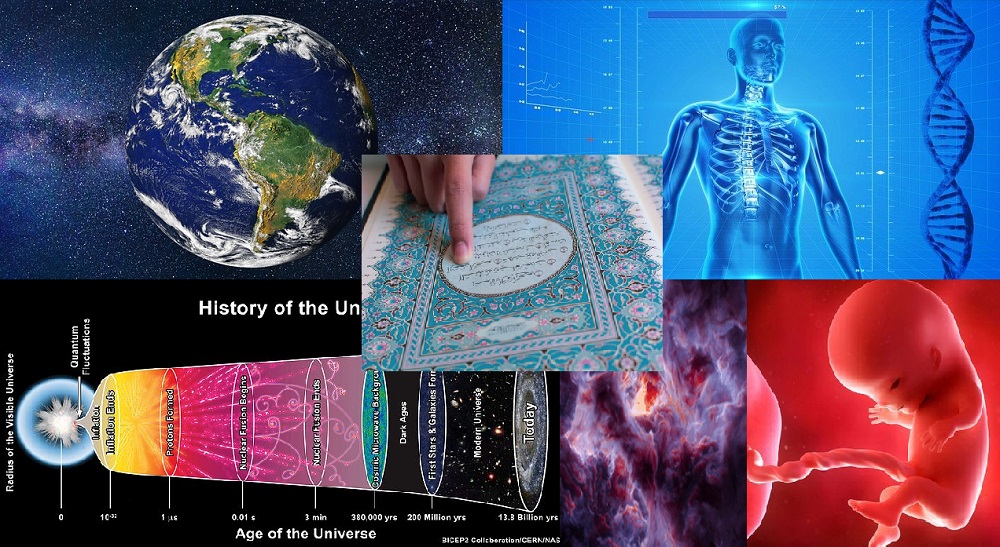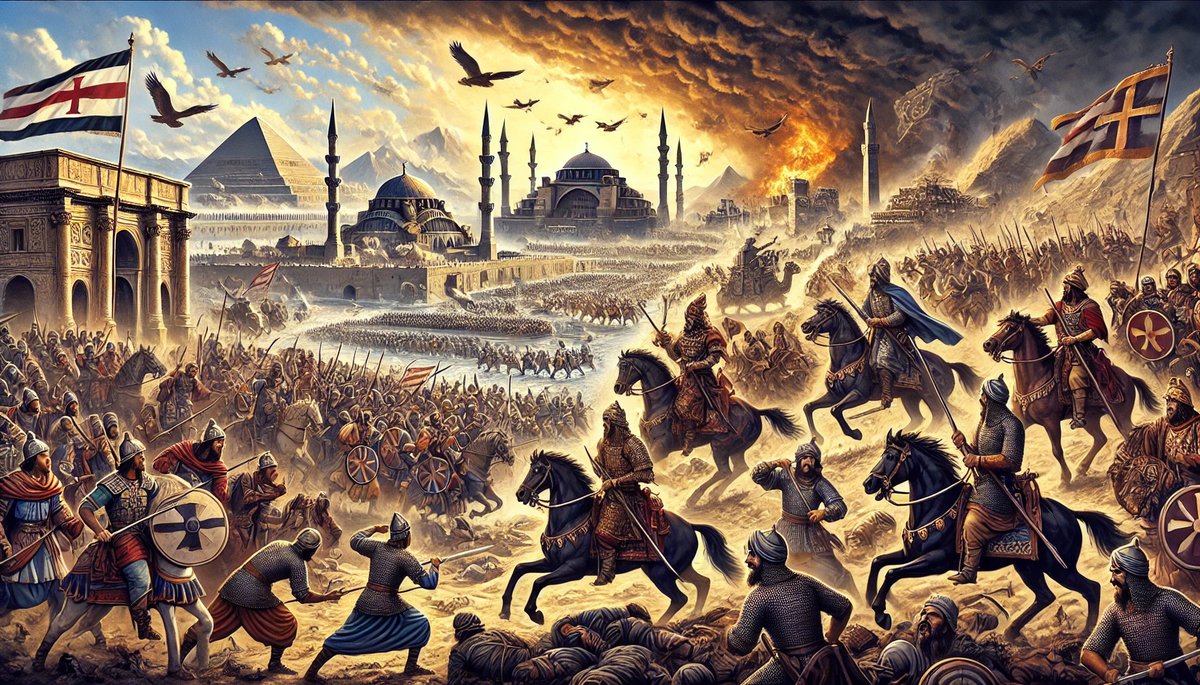Ancient Prophecies Revealed: The Bible’s Foretelling of Prophet Muhammad (ﷺ)
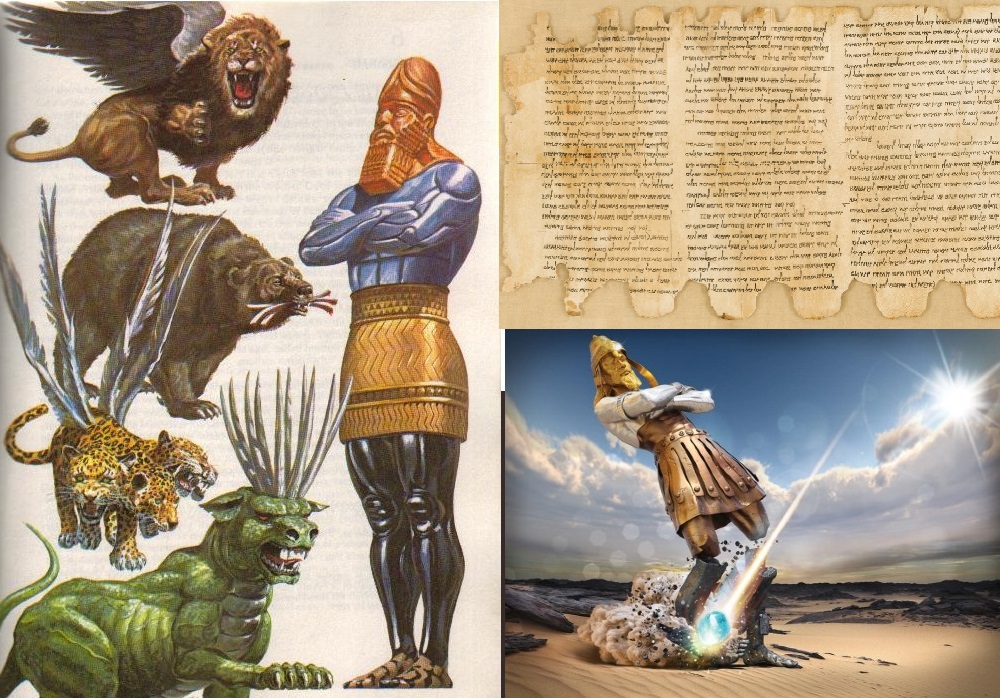
The arrival of the Prophet Muhammad(ﷺ) was foretold in several passages of the Bible. Despite the modifications that the Torah and the Gospel have undergone over the centuries, there are still prophecies that clearly point towards the coming of the Prophet Muhammad(ﷺ) and the rise of Islam.
Muslims believe in all the prophets, from Adam and Noah to Abraham, Jesus, and finally, Muhammad(ﷺ). The Quran emphasizes this continuity of faith and tells us that Abraham and Ishmael prayed to Allah to send a messenger from Ishmael’s descendants, someone who would guide their people along the righteous path. This prayer would eventually be fulfilled with the coming of the Prophet Muhammad(ﷺ), bringing the message of Islam to the world :
It follows then that the prophets consecutively announced the coming of the Prophet Muhammad(ﷺ) and that the Torah and the Gospel announced his arrival.
The rest of this article contains some biblical passages that have survived to the present day despite being altered.
A Prophet Expected by All
Historical testimonies
Although some contemporaries of the last Prophet rejected it out of animosity and prejudice, and others had simply not yet been guided, some of the biblically versed – such as Abdullâh ibn Salâm (RA) – quickly accepted Islam, and this was one of the proofs that Allah cited against the Qurayshites:
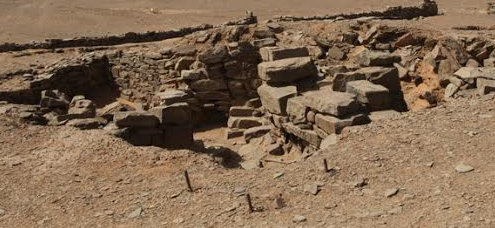
These People of the Book knew God’s promise to bless Ishmael and to make of him, in particular, a great nation. They did not believe that being born of a slave woman affected his legitimacy and knew that Abraham’s first-born son had as much right to the covenant as his brother Isaac.
The first Jews and Christians to embrace Islam all recognized that Muhammad was foretold in Scripture. Among them are Abdallah ben Salam, the two sons of Sa’ia, Benjamin, Mokhaïriq, Ka’b-ul-Ahbar, learned Jewish doctors, and as for the Christians, we need only mention the names of Bohe’ira, Nastoura the Abyssinian, and Dhafater, the Greek bishop, who converted to Islam through Dahia-Al- Kalbi, when Muhammad sent a mission to Heraclius, and was killed by his own people, and those of Jaroud, Negoch, the priests who came from Abyssinia with Ja’far son of Abu-Taleb. Heraclius, emperor of the Greeks, Moqawqas, king of Egypt, Ibn Souria, Yahia bine Akhtab, Abou Yaser ben Aktab, and others also recognized the truth of the Prophet’s mission, but they did not embrace Islam because envy lost them.
RahmatouLah al Hindi , Manisfestation of truth
Salman the Persian, the Prophet’s companion, told the story of his conversion and how he came to Medina to await the arrival of the new Prophet his master had told him about on his deathbed:
I said to him, ‘O [so-and-so], I stayed with you and loved you. Now you are about to die, so who do you recommend me to?’ He said, ‘O my son! By Allah, I do not know of anyone left who is on the same path that we follow. But the time has come for a prophet to be sent with the religion of Ibrahim (Abraham). He will appear in the land of the Arabs, and he will migrate to a land between two areas of black stone (volcanic rock) and date palm trees. He will have signs that will be unmistakable: he will refuse to eat charity, but he will accept gifts, and between his shoulders is the Seal of Prophethood. If you can go to that land, then do so.’
Musnad Ahmad
Despite the alteration, there remain—even to this day—clear indicators of Muhammad(ﷺ)’s prophethood in the Judeo-Christian tradition. I’ll mention a few.
Are you the Prophet?
Here’s a passage from the Gospel of John that proves that the Jews at the time of Jesus were waiting for a prophet:
Now this was John’s testimony when the Jewish leaders[c] in Jerusalem sent priests and Levites to ask him who he was. He did not fail to confess, but confessed freely, “I am not the Messiah.” They asked him, “Then who are you? Are you Elijah?” He said, “I am not.” “Are you the Prophet?” He answered, “No.”
John 1-19-21 (New International Version)
Now the Pharisees who had been sent questioned him, “Why then do you baptize if you are not the Messiah, nor Elijah, nor the Prophet?”
John 1-24 ( New International Version )
This passage clearly indicates that the Jews were expecting three figures:
- The Christ: For Christians, this was Jesus, while Jews who did not accept Jesus as the Messiah were still awaiting the Christ.
- Elijah: This referred to the Prophet Elijah (or Ilyas in Arabic). The Jews believed in his return, and a seat was often reserved for him in synagogues due to the belief in his imminent arrival.
- The Prophet: The Jews anticipated the coming of a prophet, as historical accounts confirm that many were expecting one to appear.
A prophet and the messiahs of Aaron and Israel
The Essenes (from Greek: Ἐσσηνοί “essēnoi”) were a movement of Judaism from the Second Temple period. They gained renown in our day following the 1947 discovery of what came to be known as the Dead Sea Scrolls.
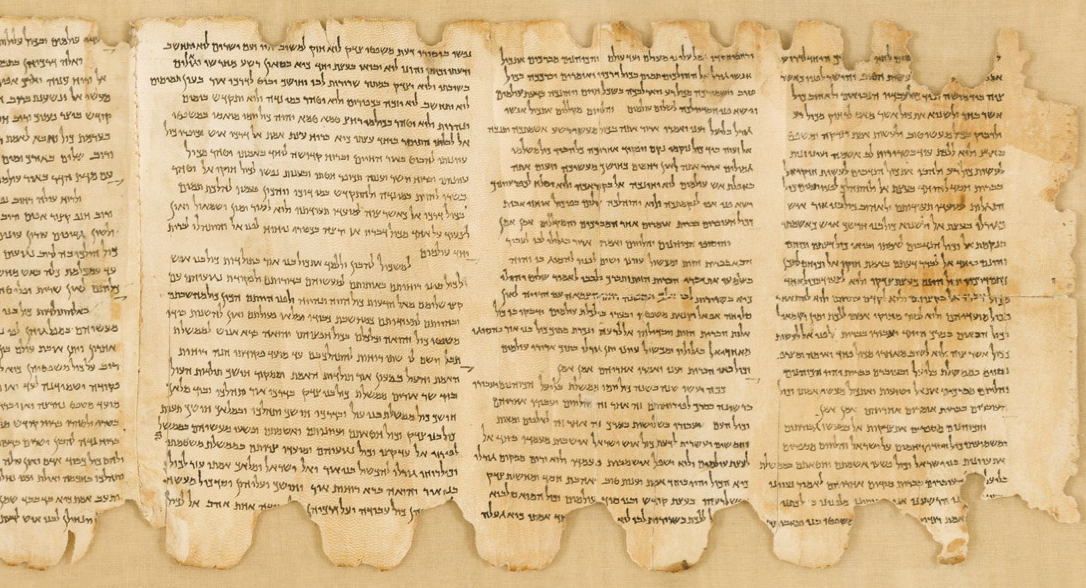
Among the documents found at Qumran is one called the “Manual of Discipline,” a kind of charter for the Jewish community of Qumran, in which they clearly emphasize the coming of three figures: two messiahs and a prophet:
Until the coming of the prophet and of both the priestly and the lay Messiah, these men are not to depart from the clear intent of the Law to walk in any way in the stubbornness of their own hearts.
Dead Sea Scrolls , community rules 1QS
Therefore, the sectarians of Qumran expected two messiahs, but they also expected a prophet, as did the other Jews. This is consistent with the passages in John 1-19 and the accounts cited in Muslim tradition that the Jews were waiting for a prophet.
Prophet Muhammad(ﷺ) Foretold by the other prophets
Everyone was awaiting a prophet, a messenger who was to come. The Quran explains that this expectation was not accidental but arose because the People of the Book (Jews and Christians) found predictions of a new prophet’s arrival in the Gospel and the Torah.
Isaiah’s prophecy: Ahmad, the chosen servant of God
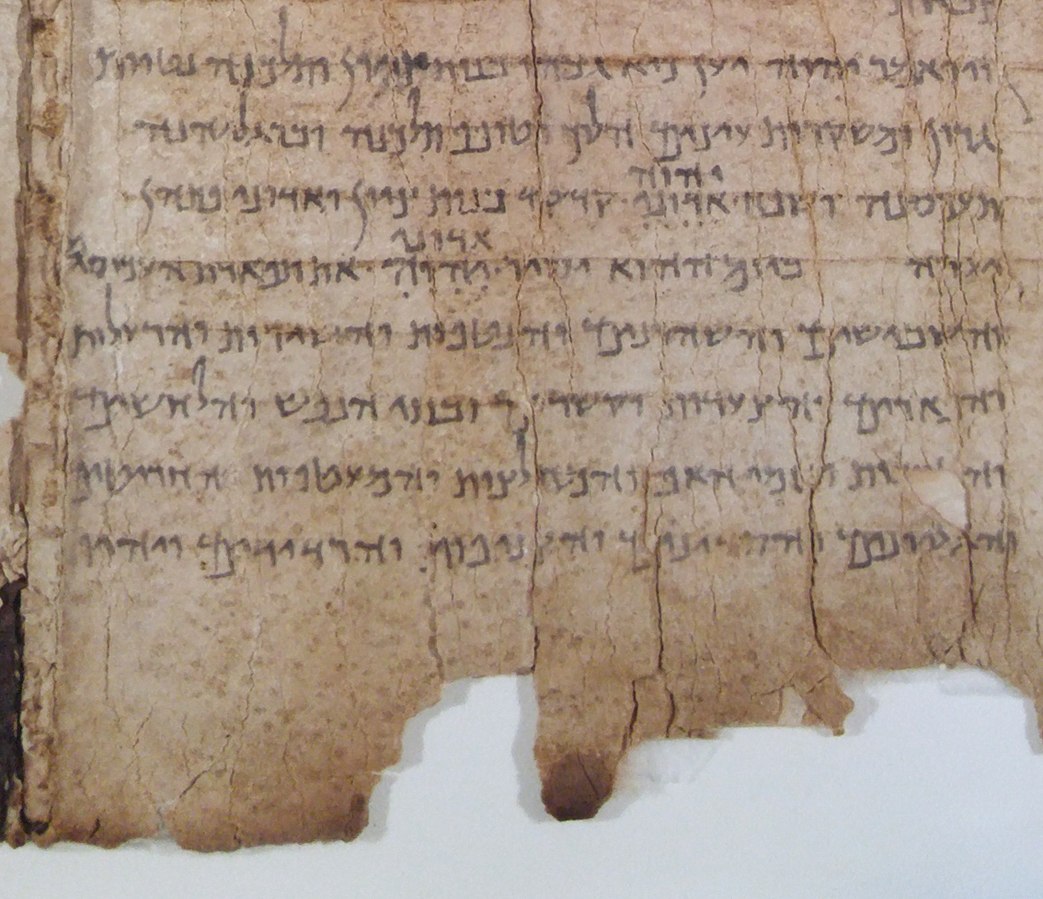
In Isaiah 42: 1-13, we can find a very interesting prophecy about the coming of the Prophet Muhammad(ﷺ). The book of Isaiah (Yeshayahu) is part of the Tanakh and appears in Christian Bibles as well as today’s Jewish Tannakhs :
Behold my servant, whom I uphold; mine elect, [in whom] my soul delighteth; I have put my spirit upon him: he shall bring forth judgment to the Gentiles. He shall not cry, nor lift up, nor cause his voice to be heard in the street. A bruised reed shall he not break, and the smoking flax shall he not quench: he shall bring forth judgment unto truth. He shall not fail nor be discouraged, till he have set judgment in the earth: and the isles shall wait for his law. Thus saith God the LORD, he that created the heavens, and stretched them out; he that spread forth the earth, and that which cometh out of it; he that giveth breath unto the people upon it, and spirit to them that walk therein: I the LORD have called thee in righteousness, and will hold thine hand, and will keep thee, and give thee for a covenant of the people, for a light of the Gentiles; To open the blind eyes, to bring out the prisoners from the prison, [and] them that sit in darkness out of the prison house. I [am] the LORD: that [is] my name: and my glory will I not give to another, neither my praise to graven images. Behold, the former things are come to pass, and new things do I declare: before they spring forth I tell you of them. Sing unto the LORD a new song, and his praise from the end of the earth, ye that go down to the sea, and all that is therein; the isles, and the inhabitants thereof. Let the wilderness and the cities thereof lift up their voice, the villages that Kedar doth inhabit: let the inhabitants of the rock sing, let them shout from the top of the mountains.
Isaiah-42 ( King James Version)
A narration from the medieval Islamic historian Ibn `Asakir (ابن عساكر, born 1106 AD in Damascus, Syria) recounts an instance involving a prominent Jewish rabbi named Kaabab (كعب). This rabbi reportedly knew the name of this awaited servant of God and confirmed that it was written in his Torah as “Ahmad”, the chosen one—described as neither rude nor harsh and not a loudmouth in markets [5]. The rabbi stated:
.أجد في التوراة: عبدي أحمد المختار, لا فظ ولا غليظ ولا صخاب في الأسواق
“I find in the Torah: My servant, Ahmad, the Chosen One. He is neither rude nor harsh, and he is not a loudmouth in markets.“
https://sunnah.com/mishkat:5771 see also https://sunnah.com/bukhari:2125
And in Another tradition
أَنْتَ عَبْدِي وَرَسُولِي سَمَّيْتُكَ الْمُتَوَكِّلَ، لَيْسَ بِفَظٍّ وَلاَ غَلِيظٍ وَلاَ سَخَّابٍ فِي الأَسْوَاقِ، وَلاَ يَدْفَعُ بِالسَّيِّئَةِ السَّيِّئَةَ وَلَكِنْ يَعْفُو وَيَغْفِرُ، وَلَنْ يَقْبِضَهُ اللَّهُ حَتَّى يُقِيمَ بِهِ الْمِلَّةَ الْعَوْجَاءَ بِأَنْ يَقُولُوا لاَ إِلَهَ إِلاَّ اللَّهُ. وَيَفْتَحُ بِهَا أَعْيُنًا عُمْيًا، وَآذَانًا صُمًّا، وَقُلُوبًا غُلْفًا
You are My slave and My messenger (i.e. Apostle). I have named you “Al-Mutawakkil” (who depends upon Allah). You are neither discourteous, harsh Nor a noisemaker in the markets And you do not do evil to those Who do evil to you, but you deal With them with forgiveness and kindness. Allah will not let him (the Prophet) Die till he makes straight the crooked people by making them say: “None has the right to be worshipped but Allah,” With which will be opened blind eyes And deaf ears and enveloped hearts
https://sunnah.com/bukhari:2125
Notice how the rabbi Kaabab pronounced the servant of God’s name from 1,200 years ago, “Abdi Ahmad, al-Mukhtar” in Arabic. This may be compared to the Hebrew equivalent in the Tanakh, “Hen abdi Ahmad, bo-behiri“, if the original word is indeed Ahmad (אחמד). It is also interesting that the narration continues: “He is neither rude nor harsh, and he is not a loudmouth in markets.“This clearly references Isaiah 42:2 . It is plausible that the rabbi memorized this prophecy from Jewish oral tradition rather than the Masoretic text, as many ancient religious teachers did in their milieu, allowing such readings to exist.
Now let’s consider the same Isae passage but quoted by Matthew, who pretended this passage was referring to Jesus Pbuh :
This was to fulfill what was spoken through the prophet Isaiah: “Here is my servant whom I have chosen, the one I love, in whom I delight; I will put my Spirit on him, and he will proclaim justice to the nations.“
Mattew 12 17-18 ( New International version
So we have three versions :
- The Masoretic version uses the word Atmak (אתמך), which is translated into: whom I uphold
- The Oral Tradition by Kaab Al Ahbar using the word: Ahmad (אחמד)
- Matthew, who wrote in Greek using the word: the one I love (Greek: agapetos )
We have many reasons to believe that the original text was, in fact, referring to the name of Prophet Muhammad(ﷺ): Ahmad :
- There is a great similarity between the words אחמד ( Ahmad ) and אתמך (Atmak ), especially the difference between the letters ת ( t) and ח ( h), ך (k: kef) and ד ( d: dalet ). This could be a mislecture in the esoteric version or even a voluntary modification.
- The word Atmak was never used elsewhere in the Bible in this form; it’s a weird word.
- Matthew used the Greek word Agapetos ( The one I Love), which is a translation that has nothing to do with ( The one I Uphold). The word Agapetos is closer to the word Ahmad, as in Aramean, hmd is the root of words meaning to desire/to regard as precious.
- In the text: he will bring justice to the Gentiles (lag-gō-w-yim), aka non-Jews, which means he will also be sent to the non Jews. It can not be an Israeli prophet as even Jesus was sent only to Israel’s lost sheep (see Matthew 15.24)
- In 42.11, Isaiah invites the Arabs (symbolized here by Qedar Ishmael’s firstborn) to rejoice and glorify the Lord who has sent them his servant and chosen one, one of their own, to draw them out of darkness into light, which applies only to Prophet Muhammad(ﷺ).
Jesus prophesies the Paraclete, the Nabi (Prophet), to come
In the Gospel of John, Jesus announces the coming of another figure who would guide humanity after him. The following passages are central to this prophecy:

And I will pray the Father, and he shall give you another Comforter, that he may abide with you for ever;
John 14:16 ( King James version)
But when the Comforter is come, whom I will send unto you from the Father, even the Spirit of truth, which proceedeth from the Father, he shall testify of me
John 15:26 ( King James version)
But the Comforter,
John 14:26 ( King James version)which is the Holy Ghost, whom the Father will send in my name, he shall teach you all things, and bring all things to your remembrance, whatsoever I have said unto you.
Nevertheless I tell you the truth; It is expedient for you that I go away: for if I go not away, the Comforter will not come unto you; but if I depart, I will send him unto you. And when he is come, he will reprove the world of sin, and of righteousness, and of judgment: Of sin, because they believe not on me; Of righteousness, because I go to my Father, and ye see me no more; Of judgment, because the prince of this world is judged.
I have yet many things to say unto you, but ye cannot bear them now. Howbeit when he, the Spirit of truth, is come, he will guide you into all truth: for he shall not speak of himself; but whatsoever he shall hear, that shall he speak: and he will shew you things to come. He shall glorify me: for he shall receive of mine, and shall shew it unto you.
John 16:7-14 ( King James version )
Before analyzing these texts in light of Prophet Muhammad(ﷺ), it is essential to consider the historical and linguistic context:
- The Gospel of John was written in Greek, while Jesus and his apostles spoke Aramaic, a Semitic language. , Jesus referred to God as “Alaha” (similar to “Allah” in Arabic) and used “Nabi” (Prophet) when discussing a future messenger.
- The Gospel of john was written by unknown author(s), probably more than 100 years after Jesus the oldest manuscript is the P52 ( dated 125-175 ) which contains only some verses from john , and the oldest full manuscript is the P66 ( dated 200 ) .
- Based on the two elements above, it’s certain that the text we have today is not the same words that came from the mouth of Jesus pbuh. However, even with all the translations and alterations, we still can find some evidence that Jesus’s original speech clearly referred to Prophet Muhammad(ﷺ).
Now, back to the passages. Jesus is talking about a “comforter,” and in other translations, we find the word “advocate.” The original word is παράκλητος (paraklētos). In ancient Greek, paraklētos broadly refers to someone who is “called to one’s side” to assist or support, and it carries various interpretations based on context.
The Christians pretend that the word paraklētos refers to the holy spirit, but the evidences show that it word used for the Aramean word “Nabi” which means Prophet:
Luke Translates Barnabas ( son of the Prophet) into son of the paraklēseōs
- in Acts 4:36, Luke writes that Barnabas’s name means “son of encouragement” or “son of consolation.” The Greek phrase used is: Βαρναβᾶς… ὅ ἐστιν μεθερμηνευόμενον Υἱὸς Παρακλήσεως (Barnabas… ho estin methermēneuomenon huios paraklēseōs). The term παρακλήσεως (paraklēseōs) is related to the word παράκλητος (paraklētos), and here it is often translated as “encouragement”, “consolation”, or “comfort”.
- “Barnabas” is understood to come from the Aramaic roots Bar (meaning “son of”) and Nabi or Nabas, which would mean “son of the prophet” or “son of prophecy”.
- This means that by this time, The Greeks who heard the word Nabi (Prophet) were translating it into the word παράκλητος (paraklētos).
The text “which is the Holy Ghost” in John 14:26 is an Alteration
The text “wich is the holy ghost” contains two major alterations :
- First alteration is adding the phrase “wich is”, this alteration is found in the king james version but is corrected in later versions like the New international version where we read : But the Advocate, the Holy Spirit, whom the Father will send in my name.
- Second alteration is that the word “Holy” does not exist in the older manuscripts of john, in the P66 , the oldest complete manuscript of John, the word used is “the spirit”, without the term “holy”, wich means that the word “holy” was later added to confirm the Christian belief that the paraclete is the holy spirit .
The prophecy is also linked to consolation ( paraclesis )
Multiple passages in the New Testament do associate prophecy with paraclesis, illustrating that prophecy often served to encourage and guide the early church. Here are some examples :
- In 1 Corinthians 14:3, Paul defines prophecy as including paraklēsis: “But the one who prophesies speaks to people for their strengthening, encouragement (paraklēsis), and comfort”.
- In Acts 15:32 ,Judas and Silas are described as prophets who provide encouragement (paraklēseōs) to the believers ” And Judas and Silas, who were themselves prophets, encouraged (parakalesan) and strengthened the brothers with many words”.
Other elements of proof that the Paracletos is a prophet, not the holy spirit
- In John 14:16, Jesus is talking about “another” paraklētos; this can not be the holy spirit. Jesus talking about another “prophet” is more logical.
- Many early Christians considered the Paraclete to be a physical person, and some took advantage of this to proclaim themselves as the expected Paraclete, for example the false Prophet Mani (who died in 274 AD) or Montanus of Phrygia, who -around 171- declared that he was the “Paraclete manifested in the flesh” .
- “For he shall not speak of himself, but whatsoever he shall hear, that shall he speak” (John, 16:13). This is a physical being with the ability to speak and hear, not an angel delivering the message to the apostles.
- “And he will tell you of things to come“. (John, 16:13). All the prophecies of the Prophet Muhammad(ﷺ) [PBUH] have been fulfilled and continue to be fulfilled to this day”.
- “The prince of this world is judged” (John, 16:11). This is Satan, as explained in John (12:31) and (14:30). The Holy Spirit who would have descended on the apostles did not judge Satan, they were persecuted and killed by those who believed in Satan and then those who believed in the authentic message of Christ were then persecuted by the Catholic Church, it was after the advent of Islam that justice was restored and Satan was judged.
Moses’ prophecy: a prophet like me
I will raise them up a Prophet from among their brethren, like unto thee, and will put my words in his mouth; and he shall speak unto them all that I shall command him. And it shall come to pass, that whosoever will not hearken unto my words which he shall speak in my name, I will require it of him. But the prophet, which shall presume to speak a word in my name, which I have not commanded him to speak, or that shall speak in the name of other gods, even that prophet shall die. And if thou say in thine heart, How shall we know the word which the LORD hath not spoken? When a prophet speaketh in the name of the LORD, if the thing follow not, nor come to pass, that is the thing which the LORD hath not spoken, but the prophet hath spoken it presumptuously: thou shalt not be afraid of him.
Deuteronomy 18-18-22 ( King james version )
1. “A Prophet from among their brethren”
The Masoretic Text (Hebrew Bible) , reads :
כִּי־נָבִיא אָקִים לָהֶם מִקֶּרֶב אֲחֵיהֶם כָּמוֹךָ וְנָתַתִּי דְּבָרַי בְּפִיו וְדִבֶּר אֲלֵיהֶם אֵת כָּל־אֲשֶׁר אֲצַוֶּנּוּ׃
(Ki-navi aqim lahem mi-qerev acheihem kamocha venatati devarai befiv vedibber aleihem et kol asher atzavennu)
- “Their brethren” (mi-qerev acheihem ) refers to the brethren of the Israelites and not the Israelites themselves ( or it would have been : from among them). The Israelites are descendants of Isaac, while the Arabs are descendants of Ishmael, Isaac’s brother. Thus, the Arabs are “brethren” to the Israelites.
- Prophet Muhammad(ﷺ) descended from Ishmael, making him from the brethren of the Israelites. This is a strong indication that the prophecy could apply to him.
2″Like unto thee” (like Moses)
The phrase “like unto thee” refers to the similarity between Moses and the promised Prophet. Prophet Muhammad(ﷺ) shares many significant characteristics with Moses that distinguish both from other prophets, including:
- A Complete Legal System:
Both Moses and Muhammad(ﷺ) (peace be upon them) were lawgivers who brought a comprehensive code of law (the Torah and the Quran) for their people. This is unlike other prophets, such as Jesus (), who did not bring a new legal system but confirmed the previous law. - Political Leadership:
Moses and Muhammad(ﷺ) (peace be upon them) were both prophets and political leaders, guiding their people not only in spiritual matters but also in governance and societal laws. - Deliverance and Nation-Building:
Moses delivered the Israelites from slavery in Egypt and led them to the Promised Land. Muhammad(ﷺ) delivered the Arabs from idolatry, uniting them under monotheism and establishing a strong nation. - Natural Birth and Death:
Both Moses and Muhammad(ﷺ) (peace be upon them) were born naturally and died natural deaths, unlike Jesus (), who was born miraculously and did not experience death in the same way. - Acceptance of Revelation:
Both received divine scripture directly from God—Moses received the Torah, and Muhammad(ﷺ) received the Quran.
3 “I will put my words in his mouth”
This phrase strongly applies to Prophet Muhammad(ﷺ), as:
- The Quran is considered the literal word of God, revealed to the Prophet Muhammad(ﷺ) through the angel Jibreel (Gabriel). Muhammad(ﷺ) recited exactly what he was commanded to say, fulfilling the promise that God’s word would be “put in his mouth.”
- Prophet Muhammad(ﷺ) was unlettered and did not compose or author the Quran himself. Instead, he conveyed the words exactly as revealed, demonstrating the fulfillment of this prophecy.
4 “He shall speak unto them all that I shall command him”
Prophet Muhammad(ﷺ) fulfilled this by:
- Delivering God’s message completely through the Quran and his sayings (Hadith).
- Conveying the message of monotheism, emphasizing worship of the one God, and correcting previous distortions in religious practices.
5 “Whosoever will not hearken unto my words… I will require it of him.”
The Quran also warns against rejecting the message of God and the consequences for those who deny the truth, aligning with this part of the prophecy. The message of accountability and judgment is a central theme in the Quran.
6 “If the thing follow not, nor come to pass, that is the thing which the LORD hath not spoken”
This passage gives criteria to test a true prophet:
- Prophet Muhammad(ﷺ) made many prophecies that came true, including:
- The defeat of the Persians by the Romans within a few years (Surah Ar-Rum, 30:1-4).
- The spread of Islam beyond Arabia and the fall of empires like Persia and Byzantium.
- The continued preservation of the Quran and its guidance for humanity.
None of Muhammad(ﷺ)’s prophecies have been proven false, affirming his truthfulness as a prophet according to the criteria in this passage.
7. Warnings Against False Prophets
The prophecy warns against false prophets who speak presumptuously in God’s name in the name of other gods. Prophet Muhammad(ﷺ) consistently called to the worship of the One True God and rejected idolatry and polytheism. His entire mission centered on monotheism, aligning with the criteria for a true prophet.
Conclusion
The prophecy in Deuteronomy 18:18-22 aligns closely with the life, mission, and characteristics of Prophet Muhammad(ﷺ). He fulfills the criteria of being “like unto Moses,” coming from the brethren of the Israelites, speaking God’s word, and demonstrating the truth of his prophethood through fulfilled prophecies and his unwavering call to monotheism.
These factors make a strong case that this prophecy refers to Prophet Muhammad(ﷺ).
Jacob’s prophecy: the schilo
The sceptre shall not depart from Judah, nor a lawgiver from between his feet, until Shiloh come; and unto him shall the gathering of the people be .
Genesis 49-10 ( king James Version)
Jacob delivered this prophecy on his deathbed, addressing his twelve sons and foretelling the futures of their respective tribes.
In the Masoteric text
לֹא־יָסוּר שֵׁבֶט מִיהוּדָה, וּמְחֹקֵק מִבֵּין רַגְלָיו, עַד כִּי־יָבֹא שִׁילֹה; וְלוֹ יִקְּהַת עַמִּים
( Lo-yasur shevet mi-Yehudah, u-mehoqeq mi-bein raglav, ad ki-yavo Shiloh; ve-lo yiqhat amim.)
This passage proclaims that the “sceptre”—a symbol of sovereign authority—will remain with Judah, understood either as the descendants of Judah specifically or as all the children of Israel collectively, until “Shiloh”(שִׁיל֔וֹ) arrives. But who is this “Shiloh,” and what does it signify?
- The term “Shiloh” (שִׁילֹה) has sparked debate for centuries. Some ancient texts, like the Targum Onkelos and a Dead Sea Scrolls manuscript, interpret Shiloh as “the Messiah,” indicating a future leader who inherits authority. This raises a question: If “Shiloh” refers to the Messiah and Jesus is associated with this figure in Christian thought, how does it relate to lineage? As a descendant of Judah and part of the house of Israel, Jesus would not take authority from Judah but continue within its lineage.
- The Hebrew word Shiloh (שִׁילֹה) and Shiloah (שִׁלֹחַ) share roots from the word sh-l-h (ש־ל־ח), meaning “to send.” While “Shiloh” translates to “he to whom it belongs,” Shiloah means “the messenger.” This prophecy could be interpreted as “The sceptre shall remain with Judah until the Messenger comes.” This refers to Prophet Muhammad (ﷺ), as he is seen as “the Messenger” who brought a universal message beyond Judah and Israel.
- The prophecy aligns with Prophet Muhammad(ﷺ) as the one who took spiritual authority from Judah’s lineage. The tribes of Israel lost sovereignty before his advent, and his message established universal guidance for humanity beyond tribal or national identity.
Shiloh may not be Jesus (blessed be he), for he is a descendant of Judah, nor was he sovereign, nor did the peoples obey him. This can only apply to the Prophet Muhammad(ﷺ).
The Name of Prophet Muhammad(ﷺ) Through Hebrew Gematria

Gematria is a form of interpretation unique to the Hebrew Bible, where numerical values are assigned to letters and phrases to uncover deeper meanings. This numerological science is often linked to the study and understanding of sacred texts.
Each letter in the Hebrew alphabet is assigned a numerical value based on its position in the alphabet. Words and phrases are then analyzed by summing these values.
Samuel Ben Yahya and His Contribution
Samuel Ben Yahya al-Maghribi (Alsamaoual) was a renowned Jewish mathematician and scholar from the 10th century. Being the son of a rabbi, he had an extensive understanding of the Hebrew Torah. At the age of 33, he converted to Islam and authored the book Ifḥām al-Yahūd (Confutation of the Jews), explaining his reasons for conversion and presenting evidence for the prophethood of Muhammad(ﷺ).
In his book, Samuel Ben Yahya asserts that the Jews were aware of the mention of Prophet Muhammad(ﷺ) in their scriptures. He uses gematria to demonstrate how the name of the Prophet appears in the Hebrew Bible, specifically in Genesis (Sefer Bereshit) 17:20, which states:
The Passage in Hebrew
ולישמעאל שמעתיך הנה ברחתי אתו והרביתי מאד שנים עשר נשיאם יוליד ונתתיו לגי גדול.
Ve le-Yishmael shema’ticha hinneh berachti oto ve-hifreiti oto ve-hirbeiti oto be-meod meod sheneim ashar Nesi’im yolid u-netattiv le-goy gadol.
Translation
“But as for Ishmael, I have heard you. Behold, I have blessed him, and I will make him fruitful, and I will multiply him exceedingly. He shall father twelve princes, and I will make him a great nation”.
Gematria Analysis
Samuel Ben Yahya highlights that this verse refers to a divine covenant with Ishmael’s descendants. The phrase מאד במאד (be-meod meod)—translated as “exceedingly much”—alludes to a descendant of Ishmael in an extraordinary manner. He demonstrates that the gematria (numerical value) of מאד במאד (be-meod meod) equals that of מחמד (Muhammad(ﷺ)), both summing to 92.
Numerical Values:
- מאד במאד (be-meod meod):
מ = 40, א = 1, ד = 4, ב = 2, מ = 40, א = 1, ד = 4 → Total = 92 - מחמד (Mohammad):
מ = 40, ח = 8, מ = 40, ד = 4 → Total = 92
Verification
You can verify this calculation using Gematria tools, such as the Gematrix website, which calculates the numerical values of Hebrew words :
Samuel’s Conclusion:
The phrase be-meod meod (‘exceedingly much’) has a numerical value of 92, identical to the numerical value of the name Muhammad (). This was placed as an enigma in this position because, if the name Muhammad had been explicitly written, the Jews would have altered or removed it, as they have done in other places.
Samuel ben yahya Ifḥām al-Yahūd (Confutation Of Jews)
This interpretation forms part of Samuel Ben Yahya’s broader argument that references to Prophet Muhammad(ﷺ) were intentionally preserved in Jewish scriptures, albeit cryptically.
Samuel Ben Yahya’s use of gematria demonstrates an intersection of sacred texts, numerology, and interpretation. For him, this numerical equivalence between “be-meod meod” and “Muhammad(ﷺ)” is further evidence of the Prophet Muhammad(ﷺ)’s divine mission, preserved in the Hebrew scriptures as a sign for those willing to reflect.
He was to come from Arabia with 10,000 saints: The conquest of Meccah in Deuteronomy.
Here is a major prophecy concerning Muhammad(ﷺ) PBUH in the Bible, that of the taking of Mecca by ten-thousand companions :
And he said, The LORD came from Sinai, and rose up from Seir unto them; he shined forth from mount Paran, and he came with ten thousands of saints: from his right hand went a fiery law for them.
Deuteronomy 33:2 ( King James Version)
Another passage:
God came from Teman, and the Holy One from mount Paran. Selah. His glory covered the heavens, and the earth was full of his praise.
Habakkuk 3:3 ( King James Version)
Sinai (Egypt) is a clear reference to Moses () and the Torah, and Seir (Palestine) is an allusion to Jesus and the Gospel. If we refuse to accept that the third reference is to Muhammad(ﷺ) and the Quran, we’ll be stuck for another momentous event that can be mentioned alongside Sinai and Jerusalem.
Paran is located in Arabia. Indeed, the Bible refers to the desert of Paran with the story of Hagar and Ishmael in these words:
“He dwelt in the desert of Paran, and his mother took him a wife from the land of Egypt.” Genesis 21.21
Ishmael, the Arabs’ ancestor, grew up in the Arabian desert, the desert of Paran. Arab tradition records that Ishmael and his mother settled in the valley of Mecca.
At the height of his ministry, the Prophet Muhammad(ﷺ) returned to Paran (Mecca), marching with 10,000 of his companions, and re-establishing the worship of the one true God in this land. Polytheism and idolatry were ousted from the surroundings of the house built by Abraham.
In the Masoretic text, we read, “with flaming fire at his right hand” instead of “from his right hand went a fiery law for them.” This describes what happened when the Islamic army approached Mecca and darkness fell. The Prophet () ordered each soldier in the army to light a fire, which became ten thousand flames of fire, and terror entered the hearts of the Quraysh polytheists.
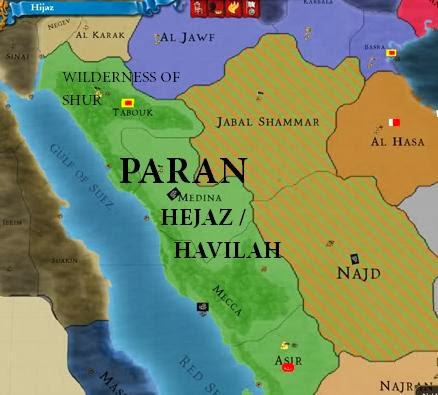
Map showing the Paran desert, the two cities, Mecca and Medina are in the territory of Paran.
Oracle In Arabia: The Hijra of Prophet Muhammad(ﷺ) from Mecca to Medina
In the The Great Isaiah Scroll (1QIsaa), discovered among the Dead Sea Scrolls, we read :
13 The oracle concerning Arabia. You will lodge in the scrub in Arabia, you caravans of Dedanites.
14 Bring water for the thirsty, O inhabitants of the land of Tema, meet the fugitive with bread.
15 For he has fled from the swords, from the drawn sword, and from the bent bow, and from the heat of battle.
16 This is what the LORD says to me: Within three years, according to the years of a hired worker, the pomp of Kedar will come to an end.
Isaiah 21:13-16
Muslim commentators believe this passage from Isaiah describes two significant events in the Prophet of Islam’s life. The first, the Hegira, marks the start of the Muslim calendar and refers to the forced exile of the Prophet and his companions from Mecca, which was occupied by the Quraysh, his own tribe descended from Qedar.
Charle Forster’s “The Historical Geography of Arabia” (London, vol. 1, pp. 238-266) cites Ptolemy and Pliny to show that the sons of Qedar lived in the Hijaz, with Mecca (Macoraba) as their capital. This area includes Medina, known as the “land of Tema,” which is both a locality north of Medina and a name from Genesis 25:13-15 referring to one of Ishmael’s sons.
Dedan refers to a tribe descended from Dedan, grandson of Abraham, and a city located at Al-‘Ulâ in the Medina region. Eduard Glaser established the connection between ancient Dedan and modern Al-‘Ulâ in 1890. Both cities were historically inhabited by Jewish tribes.
The second event prophesied by Isaiah, referring to “One more year, like the years of a hireling, and all the glory of Qedar will be done away with“, is the Battle of Badr. This conflict occurred one year after the Hegira, involving the Quraysh tribe from Mecca, descendants of Qedar, against the Muslims in Medina, resulting in a Muslim victory. The battle was crucial, prompting Prophet Muhammad (ﷺ) to beseech God for victory, emphasizing Arabia’s significance in biblical prophecies.
Islam As The Kingdom Of God In the Torah and the gospeGospel
Jesus Announcing the Good News of The Kingdom of God.
The kingdom of God is a central element in Judeo-Christian beliefs. The expression “kingdom of God”, in its various forms, is found nearly a hundred times in the mouth of Jesus:
If the word is frequently read, the idea is even more frequently encountered, and there’s no mistaking the fact that “the kingdom of God” is the fundamental concept of Jesus’ preaching.
Dictionnaire Vigouroux de la bible
( Tome 5 page 1242)
Jesus said, for example:
“I must also preach the good news (euangelisasthai me dei ) of the kingdom of God to the other towns; for this is why I was sent.”
Luke 4.43
The Kingdom of God represents the good news that Jesus came to proclaim. The term “gospel,” from the Greek “euaggelion,” means “good news.”
Contrary to certain interpretations, the Kingdom of God is not a distant, spiritual realm in the afterlife. Instead, it is portrayed as an earthly reality. Renowned New Testament scholar Bart Ehrman explains:
This kingdom of God is not ‘heaven’-the place you go when you die (as in later Christian tradition). It’s a real earthly kingdom.
Jesus, Interrupted, Revealing the Hidden Contradictions in the Bible,Bart Ehrman HarperCollins,2009, p. 157
We know from the Quran that the “Good news” Announced by Jesus ( ) is the coming of the Prophet Muhammad(ﷺ) :
Multiple passages in the Bible can be interpreted as pointing toward the Advent of Islam. The Kingdom of God is closely associated with a nation that will produce its fruits, a nation identified with the Arabs.
Breaking the covenant with Israel and the nation that will bear the fruit of the Kingdom of God
If the Hebrew people are to maintain their claim to divine election, they must be careful not to break the Law:
If those ordinances depart from before me, saith the LORD, then the seed of Israel also shall cease from being a nation before me for ever.
Jeremiah 31:36 ( King James version)
The sons of Israel committed two major sins: idolatry and the murder of prophets.
Following the parable of the vinedressers (Matthew 21:33-39), which symbolically describes how the sons of Israel persecuted and killed the prophets, Jesus clearly announces to his Jewish contemporaries that the Kingdom of God will be taken away from them and given to another nation:
Therefore say I unto you, The kingdom of God shall be taken from you, and given to a nation bringing forth the fruits thereof. And whosoever shall fall on this stone shall be broken: but on whomsoever it shall fall, it will grind him to powder.
Matthew 21:43 ( king james version)
This prophecy of Jesus is to be compared with the words that Moses relates of his Lord concerning the Hebrews:
They have provoked me to jealousy with that which is not God. They have provoked me to anger with their vain idols.And I will provoke them to jealousy by that which is not a people. I will provoke them to anger with a foolish nation.
Deuteronomy 32:21
(Deuteronomy 32, 21)
In both texts, we’re talking about a nation in the singular form and not several nations, as Christians today interpret the text as referring to the uncircumcised Gentiles.
This “foolish nation”, i.e., ignorant, can only be the Arab nation (described elsewhere as Jahiliya = foolish) to whom the mission of the Prophet will be entrusted, which will provoke the jealousy of the Jewish people. This is what actually happened: a divided and illiterate nation of Arabia received the last messenger, which irritated the Jews of the time and today, who expected this messenger to appear in their ranks.
Jesus and the Parable of the Mustard Seed: A Connection to the Quranic Prophecy
Jesus often used parables to illustrate the nature of the Kingdom of God. One of the most famous is the parable of the mustard seed, as recounted in the Gospel of Matthew:
He told them another parable: ‘The kingdom of heaven is like a mustard seed, which a man took and planted in his field. Though it is the smallest of all seeds, yet when it grows, it is the largest of garden plants and becomes a tree, so that the birds come and perch in its branches.’
(Matthew 13:31-32)
While the Gospels have undergone changes over time, this parable resonates profoundly with the Quranic description of Prophet Muhammad(ﷺ) and his companions, as found in Surah Al-Fath :
The parable of the mustard seed aligns closely with the Quranic portrayal of the Islamic community. Just as the mustard seed begins as the smallest of seeds but grows into a majestic tree, the Islamic Ummah (community) began as a small group of faithful companions around Prophet Muhammad(ﷺ). Despite their humble beginnings, they grew stronger and more steadfast under divine guidance, eventually forming a great nation and a powerful kingdom that spread the message of God across the earth.
This growth reflects a transformation, both spiritual and collective, one that astonishes observers and fulfills divine promises. Just as the mustard seed delights the sower by its growth, the Quran describes the companions of the Prophet as a source of pride and wonder for those who believe while evoking dismay in their opponents.
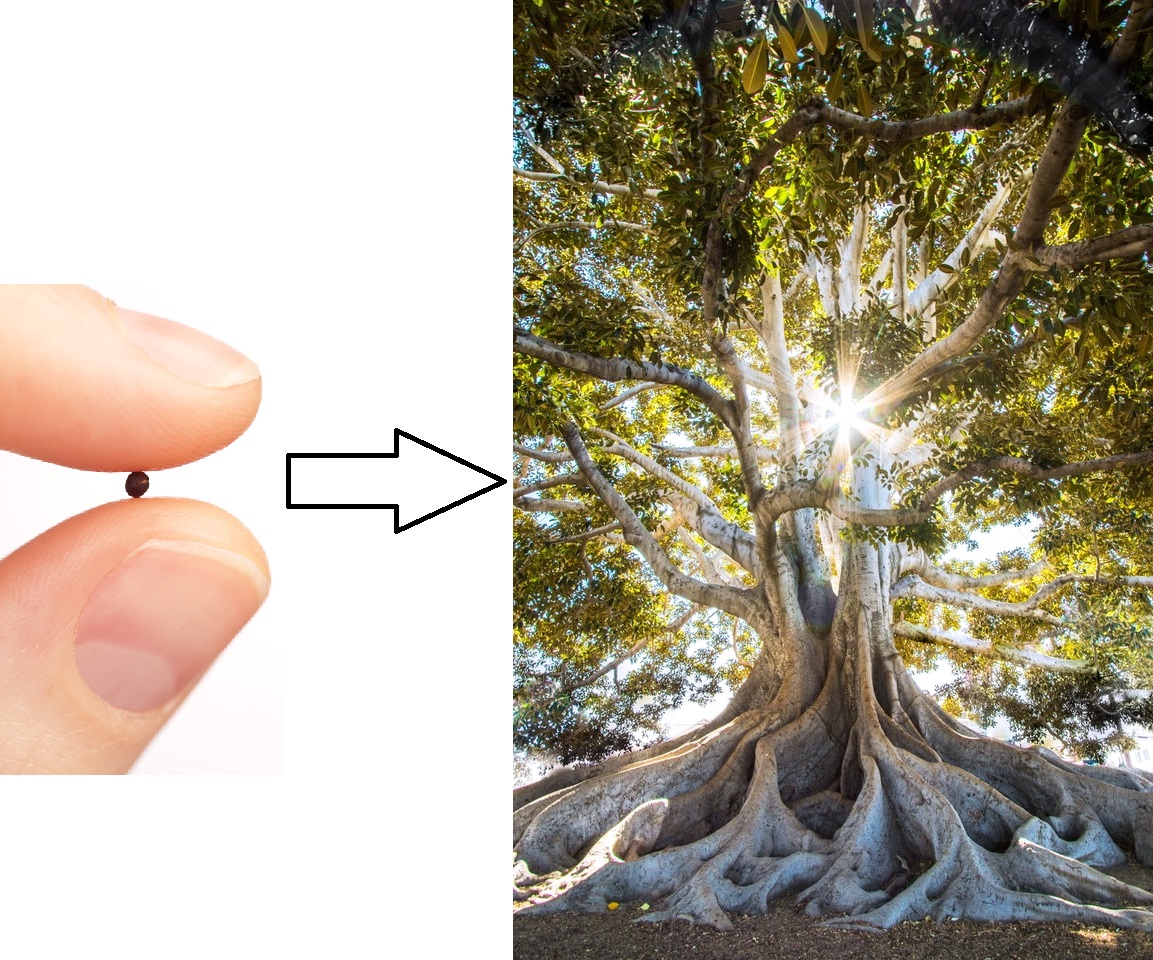
The Great Nation of Ishmael
In Genesis 17:1-14, 20, the Bible gives a profound account of God’s covenant with Abraham and his descendants. The passage reads:
When Abraham was 99 years old, the Lord appeared to him and said: I am the Almighty God… I will establish my covenant between me and you and your descendants after you throughout their generations: it will be an everlasting covenant, by which I will be your God and the God of your descendants after you. I will give to you and your descendants after you the land in which you reside, all the land of Canaan, as an everlasting possession, and I will be their God. God said to Abraham: As for you, you shall keep my covenant, you and your descendants after you throughout their generations. This is how you will keep the covenant between me and you and your descendants after you: every male among you shall be circumcised. You shall be circumcised as a sign of the covenant between me and you. An uncircumcised male… shall be cut off from his people; he has broken my covenant. As for Ishmael, I have heard you: I will bless him, I will make him fruitful and will multiply him exceedingly; he will father twelve princes, and I will make him a great nation. (See also Genesis 21:18)
These verses indicate that God established a covenant with Abraham and his descendants, marked by the sign of circumcision. Abraham obeyed this command by circumcising all the males in his household, starting with Ishmael. God made two promises: to give Abraham and his descendants the land of Canaan and to bless Ishmael. In summary, the key provisions are the covenant with Abraham and his descendants, the promise of the land in perpetuity, and the blessing of Ishmael.
The Kingdom of God: Daniel’s 5th Kingdom
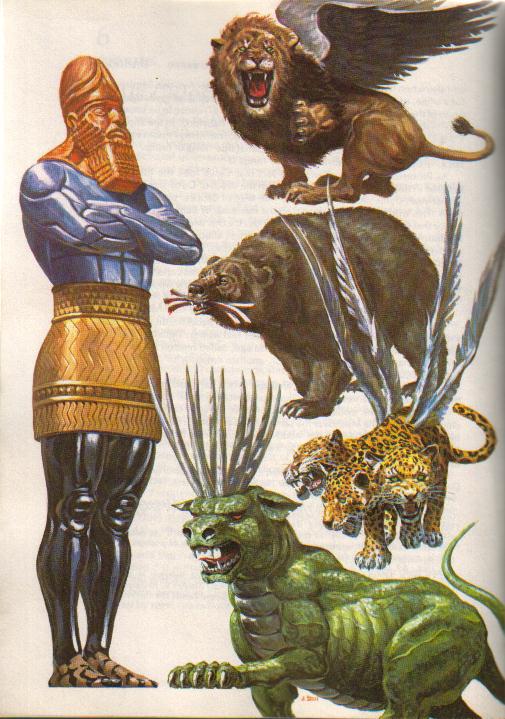
Jesus’ prophecy about the “kingdom of God” can be compared to two visions in Daniel: one by King Nebuchadnezzar, explained by Daniel, and the other by Daniel himself, explained by an angel.
The statue of the four kingdoms
Thou, O king, sawest, and behold a great image. This great image, whose brightness was excellent, stood before thee; and the form thereof was terrible. This image’s head was of fine gold, his breast and his arms of silver, his belly and his thighs of brass, His legs of iron, his feet part of iron and part of clay. Thou sawest till that a stone was cut out without hands, which smote the image upon his feet that were of iron and clay, and brake them to pieces. Then was the iron, the clay, the brass, the silver, and the gold, broken to pieces together, and became like the chaff of the summer threshingfloors; and the wind carried them away, that no place was found for them: and the stone that smote the image became a great mountain, and filled the whole earth.
This is the dream; and we will tell the interpretation thereof before the king. Thou, O king, art a king of kings: for the God of heaven hath given thee a kingdom, power, and strength, and glory. And wheresoever the children of men dwell, the beasts of the field and the fowls of the heaven hath he given into thine hand, and hath made thee ruler over them all. Thou art this head of gold.
And after thee shall arise another kingdom inferior to thee, and another third kingdom of brass, which shall bear rule over all the earth.
And the fourth kingdom shall be strong as iron: forasmuch as iron breaketh in pieces and subdueth all things: and as iron that breaketh all these, shall it break in pieces and bruise. And whereas thou sawest the feet and toes, part of potters’ clay, and part of iron, the kingdom shall be divided; but there shall be in it of the strength of the iron, forasmuch as thou sawest the iron mixed with miry clay. And as the toes of the feet were part of iron, and part of clay, so the kingdom shall be partly strong, and partly broken. And whereas thou sawest iron mixed with miry clay, they shall mingle themselves with the seed of men: but they shall not cleave one to another, even as iron is not mixed with clay.
And in the days of these kings shall the God of heaven set up a kingdom, which shall never be destroyed: and the kingdom shall not be left to other people, but it shall break in pieces and consume all these kingdoms, and it shall stand for ever.Forasmuch as thou sawest that the stone was cut out of the mountain without hands, and that it brake in pieces the iron, the brass, the clay, the silver, and the gold; the great God hath made known to the king what shall come to pass hereafter: and the dream is certain, and the interpretation thereof sure.
Daniel 2 ( king James Version)
Here, Daniel announces what will happen in the coming centuries: 4 kingdoms will succeed one another on earth. Here, the earth in question is the New World, and in particular, the land promised to Abraham’s descendants, from the Nile to the Euphrates, which includes the Holy Land:
- The Babylonian Empire.
- The Medo-Persian Empire.
- The Greek Empire
- The Roman Empire.
He announces the arrival of 3 other kingdoms after the Kingdom of Nab. In another dream, Daniel saw four animals again representing these four kingdoms.
The statue represents Nebuchadnezzar’s vision, and the beast represents Daniel’s vision.
The vision of the four beasts
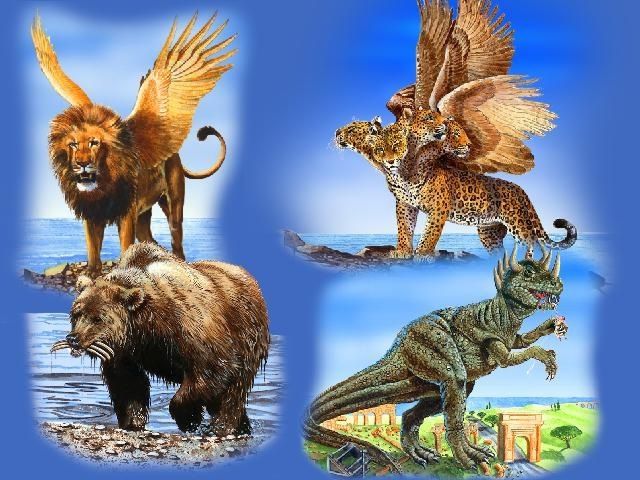
In the first year of Belshazzar king of Babylon Daniel had a dream and visions of his head upon his bed: then he wrote the dream, and told the sum of the matters. Daniel spake and said, I saw in my vision by night, and, behold, the four winds of the heaven strove upon the great sea. And four great beasts came up from the sea, diverse one from another. The first was like a lion, and had eagle’s wings: I beheld till the wings thereof were plucked, and it was lifted up from the earth, and made stand upon the feet as a man, and a man’s heart was given to it. And behold another beast, a second, like to a bear, and it raised up itself on one side, and it had three ribs in the mouth of it between the teeth of it: and they said thus unto it, Arise, devour much flesh. After this I beheld, and lo another, like a leopard, which had upon the back of it four wings of a fowl; the beast had also four heads; and dominion was given to it. After this I saw in the night visions, and behold a fourth beast, dreadful and terrible, and strong exceedingly; and it had great iron teeth: it devoured and brake in pieces, and stamped the residue with the feet of it: and it was diverse from all the beasts that were before it; and it had ten horns. I considered the horns, and, behold, there came up among them another little horn, before whom there were three of the first horns plucked up by the roots: and, behold, in this horn were eyes like the eyes of man, and a mouth speaking great things.
Daniel’s Vision of the Ancient of Days
I beheld till the thrones were cast down, and the Ancient of days did sit, whose garment was white as snow, and the hair of his head like the pure wool: his throne was like the fiery flame, and his wheels as burning fire.
A fiery stream issued and came forth from before him: thousand thousands ministered unto him, and ten thousand times ten thousand stood before him: the judgment was set, and the books were opened.
I beheld then because of the voice of the great words which the horn spake: I beheld even till the beast was slain, and his body destroyed, and given to the burning flame. As concerning the rest of the beasts, they had their dominion taken away: yet their lives were prolonged for a season and time.
I saw in the night visions, and, behold, one like the Son of man came with the clouds of heaven, and came to the Ancient of days, and they brought him near before him.
And there was given him dominion, and glory, and a kingdom, that all people, nations, and languages, should serve him: his dominion is an everlasting dominion, which shall not pass away, and his kingdom that which shall not be destroyed.
Daniel’s Visions Interpreted
I Daniel was grieved in my spirit in the midst of my body, and the visions of my head troubled me. I came near unto one of them that stood by, and asked him the truth of all this. So he told me, and made me know the interpretation of the things. These great beasts, which are four, are four kings, which shall arise out of the earth. But the saints of the most High shall take the kingdom, and possess the kingdom for ever, even for ever and ever.
Then I would know the truth of the fourth beast, which was diverse from all the others, exceeding dreadful, whose teeth were of iron, and his nails of brass; which devoured, brake in pieces, and stamped the residue with his feet; And of the ten horns that were in his head, and of the other which came up, and before whom three fell; even of that horn that had eyes, and a mouth that spake very great things, whose look was more stout than his fellows. I beheld, and the same horn made war with the saints, and prevailed against them; Until the Ancient of days came, and judgment was given to the saints of the most High; and the time came that the saints possessed the kingdom.
Thus he said, The fourth beast shall be the fourth kingdom upon earth, which shall be diverse from all kingdoms, and shall devour the whole earth, and shall tread it down, and break it in pieces. And the ten horns out of this kingdom are ten kings that shall arise: and another shall rise after them; and he shall be diverse from the first, and he shall subdue three kings. And he shall speak great words against the most High, and shall wear out the saints of the most High, and think to change times and laws: and they shall be given into his hand until a time and times and the dividing of time. But the judgment shall sit, and they shall take away his dominion, to consume and to destroy it unto the end. And the kingdom and dominion, and the greatness of the kingdom under the whole heaven, shall be given to the people of the saints of the most High, whose kingdom is an everlasting kingdom, and all dominions shall serve and obey him.
Daniel 7 ( King james version)
The stone that destroys the statue in Daniel 2 is the people of the saints of the Most High. Who will kill the 10-horned beast in Daniel 7 is the Kingdom of Islam, which ended the Roman Empire’s reign on the Holy Land in 637 and established a great Kingdom of pure monotheism where God reigns.
How Christians interpret these predictions
Christians are unanimous on the fact that the first four nations are indeed Babylon, Medea, the Greeks, and then the Romans; however, as they do not wish to recognize the prophecy of the Prophet Muhammad(ﷺ), they completely ignore the history and reality of the 5ᵉ Kingdom and come up with two hypotheses:
- The first (whose supporters are few in number) is that the 5ᵉ Kingdom began with the arrival of Jesus, yet it is clear that the arrival of Jesus did not give rise to the fulfillment of prophecy given that the 4th Kingdom ( Roman Empire ) did not reach its apogee until, after the rise of Jesus PBUH, it was in 117 AD that the empire reached its greatest expansion.
- The second is that we are still in the era of the 4ᵉ Kingdom and that we are now in the era of division ( Iron mixed with clay ) and that this 4ᵉ Kingdom is represented today by the European Countries, and that the imminent return of Jesus will create the new Kingdom of God Godch will destroy this 4th Kingdom.
It is the second Hypothesis that has the most supporters among Christians; however, it does not really hold water :
- To consider that the European countries represent the Kingdom that dominates the earth is to ignore the meaning of the “earth” in the Torah; the land in question is the Holy Land (from the Nile to the Euphrates); the prophecy did not speak of nations controlling Paris or Berlin, but of kingdoms that succeeded one another on the holy land, and the Kingdom that took over the holy land from Rome and what remained of the Persian empire is the Muslim Kingdom that has established itself over the entire holy land.
- The prophecy speaks of 4 Kingdoms and then of a 5ᵉ Kingdom that reigns over the holy land, which doesn’t leave much choice because if we consider that the 5ᵉ Kingdom is not the Kingdom of Islam, it means that there should be six kingdoms, and in that case, the prophecy would be false. The only explanation that will vindicate this prophecy is that the 5ᵉ Kingdom is the Kingdom of Islam.
- In the prophecy, there is an interesting passage that helps to set the context: “And the ten horns are ten kings who will rise from this Kingdom. And another shall rise after them, and shall be diverse from the first, and shall make low three kings. 25He will speak words against the Most High, he will oppress the saints of the Most High, and he will hope to change the times and the law; and the saints will be delivered into his hands for a time, times, and half a time” “The 10 kings correspond to the 10 Roman emperors who persecuted the Christians, and the King who is different from the first is none other than Constantine I, the one who forced the Nicene symbol, the symbol that made Jesus a Divinity (pronounced words against the Most High), this King then persecuted those who continued to believe in the true message of Jesus (and the saints will be delivered into his hands), the persecution continued until the appearance of Islam.
- The Kingdom of God is also the manifestation of God’s covenant with Abraham, and only a covenant-observing nation can enjoy this privilege. Circumcision being the sign of the covenant, the prophecy can only apply to a circumcised nation: “You shall circumcise yourselves as a sign of the covenant, between you and me… an uncircumcised male… shall be cut off from among his people” Genesis 17.


